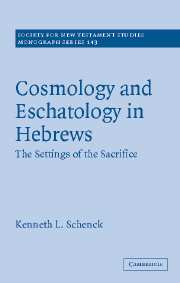1 - The Quest for the Historical Hebrews
Published online by Cambridge University Press: 22 September 2009
Summary
Introduction
The main challenge for anyone wishing to use historical-critical methods to interpret the Epistle to the Hebrews is our almost complete lack of knowledge of its original context. Since the meaning of words is a function of their use in particular ‘language games’, biblical scholarship faces an uphill battle when attempting to interpret texts whose original ‘forms of life’ are so far removed from us in time and culture. The case becomes acute with regard to Hebrews, whose origins are so uncertain. We ultimately must consign ourselves to a certain amount of agnosticism as far as the original meaning is concerned. While we may create plausible hypotheses, we may never be able to speak definitively on even the most basic issues.
It is therefore no surprise that the ‘riddles’ relating to Hebrews' origin have given rise to an immense body of literature, as countless individuals have attempted to fill in the epistle's glaring gaps in context. Indeed, in addition to the identity of the author and point of origin, the recipients and destination of the epistle are also unidentified, together constituting its ‘four great unknowns’. The matter of background in particular remains one of the most important issues on which no decisive consensus exists. Significant disagreement persists concerning what first-century milieu(s) might best explain the epistle's thought and imagery.
This area of Hebrews' research has passed through various phases, and a number of possible options have been proposed at one time or another.
- Type
- Chapter
- Information
- Cosmology and Eschatology in HebrewsThe Settings of the Sacrifice, pp. 1 - 23Publisher: Cambridge University PressPrint publication year: 2007



